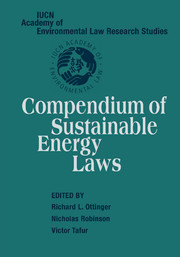Book contents
- Frontmatter
- Contents
- Acknowledgments
- Introduction
- I WORLD ENERGY ASSESSMENT
- II INTERNATIONAL AGREEMENTS
- III INTERNATIONAL LAW DECLARATIONS AND OTHER SOFT LAW INSTRUMENTS
- IV ACTION PLANS AND MULTILATERAL OPERATION RECOMMENDATIONS
- Plan of Implementation for the United Nations World Summit on Sustainable Development
- Decision of the Commission on Sustainable Development, Ninth Session
- Recommendation of the Council on Environmentally Favourable Energy Options and Their Implementation
- Recommendation of the Council on Improving the Environmental Performance of Public Procurement
- Recommendation of the Council on Traffic Limitation and Low-cost Improvement of the Urban Environment
- V SELECT REGIONAL INTERNATIONAL ENERGY AGREEMENTS
- VI SELECT NATIONAL LEGISLATION ILLUSTRATIVE OF SUSTAINABLE ENERGY LAW INNOVATIONS
- Index
Decision of the Commission on Sustainable Development, Ninth Session
Published online by Cambridge University Press: 03 May 2010
- Frontmatter
- Contents
- Acknowledgments
- Introduction
- I WORLD ENERGY ASSESSMENT
- II INTERNATIONAL AGREEMENTS
- III INTERNATIONAL LAW DECLARATIONS AND OTHER SOFT LAW INSTRUMENTS
- IV ACTION PLANS AND MULTILATERAL OPERATION RECOMMENDATIONS
- Plan of Implementation for the United Nations World Summit on Sustainable Development
- Decision of the Commission on Sustainable Development, Ninth Session
- Recommendation of the Council on Environmentally Favourable Energy Options and Their Implementation
- Recommendation of the Council on Improving the Environmental Performance of Public Procurement
- Recommendation of the Council on Traffic Limitation and Low-cost Improvement of the Urban Environment
- V SELECT REGIONAL INTERNATIONAL ENERGY AGREEMENTS
- VI SELECT NATIONAL LEGISLATION ILLUSTRATIVE OF SUSTAINABLE ENERGY LAW INNOVATIONS
- Index
Summary
DECISION 9/1
ENERGY FOR SUSTAINABLE DEVELOPMENT
General considerations
Energy is central to achieving the goals of sustainable development.
The magnitude and scale of energy needs facing the world today in relation to sustainable development can be gauged by the fact that nearly one third of the global population of six billion, mostly living in developing countries, continue to lack access to energy and transportation services. Wide disparities in the levels of energy consumption within and between developed and developing countries exist. Current patterns of energy production, distribution and utilization are unsustainable.
The challenge ahead will require adequate, predictable, new and additional financial resources, in accordance with chapter 33 of Agenda 21, and paragraphs 76 to 87 of the Programme for the Further Implementation of Agenda 21, technology transfer and, where appropriate, political will, as well as commitment to innovative ways of applying energy efficient, environmentally sound, and cost-effective technologies and systems to all sectors of the economy. Energy resources are plentiful, and environmentally sound technological options exist and should be made available and facilitated by developed countries to developing countries as well as countries with economies in transition with a view to making energy for sustainable development a reality. Ensuring adequate and affordable access to energy for present and future generations, in an environmentally sound, socially acceptable and economically viable way, will require considerable efforts and substantial investments, including from the private sector. Attention will also need to be given to promoting an enabling environment.
[…]
- Type
- Chapter
- Information
- Compendium of Sustainable Energy Laws , pp. 157 - 166Publisher: Cambridge University PressPrint publication year: 2005



